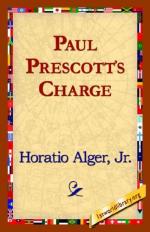“If you must be so foolish as to set up for yourself, take this,” said the farmer, placing half a dollar in his hand. “You may reach the city after the banks are closed for the day, you know,” he added, jocularly.
But it was in the morning that Paul came in sight of the city. He climbed up into a high tree, which, having the benefit of an elevated situation, afforded him an extensive prospect. Before him lay the great city of which he had so often heard, teeming with life and activity.
Half in eager anticipation, half in awe and wonder at its vastness, our young pilgrim stood upon the threshold of this great Babel.
Everything looked new and strange. It had never entered Paul’s mind, that there could be so many houses in the whole State as now rose up before him. He got into Broadway, and walked on and on thinking that the street must end somewhere. But the farther he walked the thicker the houses seemed crowded together. Every few rods, too, he came to a cross street, which seemed quite as densely peopled as the one on which he was walking. One part of the city was the same as another to Paul, since he was equally a stranger to all. He wandered listlessly along, whither fancy led. His mind was constantly excited by the new and strange objects which met him at every step.
As he was looking in at a shop window, a boy of about his own age, stopped and inquired confidentially, “when did you come from the country?”
“This morning,” said Paul, wondering how a stranger should know that he was a country boy.
“Could you tell me what is the price of potatoes up your way?” asked the other boy, with perfect gravity.
“I don’t know,” said Paul, innocently.
“I’m sorry for that,” said the other, “as I have got to buy some for my wife and family.”
Paul stared in surprise for a moment, and then realizing that he was being made game of, began to grow angry.
“You’d better go home to your wife and family,” he said with spirit, “or you may get hurt.”
“Bully for you, country!” answered the other with a laugh. “You’re not as green as you look.”
“Thank you,” said Paul, “I wish I could say as much for you.”
Tired with walking, Paul at length sat down in a doorway, and watched with interest the hurrying crowds that passed before him. Everybody seemed to be in a hurry, pressing forward as if life and death depended on his haste. There were lawyers with their sharp, keen glances; merchants with calculating faces; speculators pondering on the chances of a rise or fall in stocks; errand boys with bundles under their arms; business men hurrying to the slip to take the boat for Brooklyn or Jersey City,—all seemed intent on business of some kind, even to the ragged newsboys who had just obtained their supply of evening papers, and were now crying them at the top of their voices,—and very discordant ones at that, so Paul thought. Of the hundreds passing and repassing before him, every one had something to do. Every one had a home to go to. Perhaps it was not altogether strange that a feeling of desolation should come over Paul as he recollected that he stood alone, homeless, friendless, and, it might be, shelterless for the coming night.




